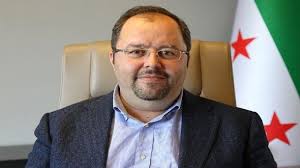A high-profile lawsuit filed in the U.S. District Court of Massachusetts has cast a long shadow over parts of Syria’s exiled opposition, with four prominent figures—Mustafa Sabbagh, Mahmoud Sabbagh, Ghassan Hitto, and Yaser Tabbara—accused of orchestrating a transnational fraud and money laundering scheme that allegedly defrauded a Libyan-American businessman of $4 million.
The complaint, brought by human rights advocate Imadeddin Al-Muntasser, claims that the defendants misused their political visibility and past affiliations with the Syrian opposition to lure investments into what he describes as fake ventures, including a gold-trading company in Turkey and a luxury hotel in Istanbul. The lawsuit lists 13 counts, including wire fraud, securities violations, breach of fiduciary duty, and money laundering.
Of particular note in the complaint is the mention of the Syrian Forum, a U.S.-registered nonprofit long associated with opposition-linked humanitarian and development work. Al-Muntasser alleges that the Syrian Forum was used to give the fraudulent operation a veneer of legitimacy and to dissuade him from pursuing legal action, warning him that going public would “harm humanitarian efforts for the Syrian people.”
Syrian Forum Responds: “No Affiliation, No Involvement”
In response to these allegations, the Syrian Forum issued a detailed statement on June 29, strongly distancing itself from the case and from Mr. Mustafa Sabbagh, who is at the center of the legal action. The Forum emphasized that it is not a defendant in the lawsuit and “categorically denies any involvement in the conduct at issue.”
The organization stated that it had maintained “strict and complete separation” between its institutional work and Mr. Sabbagh’s private business dealings, adding that he had not held any executive, financial, or decision-making role within the Forum for the past three years. Moreover, the Forum confirmed that Sabbagh’s affiliation was formally and permanently severed on April 27, 2024, following an internal review.
The statement further noted that Mr. Sabbagh “has never been authorized to sign on behalf of any of the Forum’s bank accounts,” and that since 2015, he has not made any financial contributions to the organization. It also clarified that the Syrian Business Forum, chaired by Sabbagh and based in Doha, is a legally and institutionally separate entity.
Regarding the inclusion of current Forum leadership in the lawsuit—specifically CEO Ghassan Hitto and board member Yaser Tabbara—the organization said both men “categorically deny the allegations” and stressed that they had “no knowledge” of any fraudulent activity. Instead, both individuals claim to have suffered personal financial losses after investing their own savings with Sabbagh in what they believed were legitimate private ventures, wholly unrelated to the Forum.
“All financial and administrative operations of the Syrian Forum are subject to regular review by independent audit firms and Turkish regulatory bodies,” the statement added, asserting the group’s ongoing commitment to transparency and integrity.
A Crisis of Trust for Syria’s Opposition?
The case has already sent ripples through Syrian political and humanitarian circles, raising difficult questions about the financial ethics and oversight mechanisms of opposition-linked figures and institutions.
Al-Muntasser claims that the funds he invested were originally earmarked for charitable projects in Libya and Syria. Instead, he says, they were diverted into private business dealings under the cover of humanitarian and political work. The lawsuit alleges that documents, financial statements, and even licensing claims were fabricated to convince him of the legitimacy and profitability of the ventures.
According to court filings, the defendants leveraged their roles in Syrian opposition bodies to establish political legitimacy, used the Syrian Forum’s reputation to shield scrutiny, and relied on shell companies like İNCE Gold and Sabbagh Investment Group (SIG) to move and launder funds.
As legal proceedings unfold in Massachusetts, observers warn that the damage may already be done—particularly to the public image of Syrian civil society abroad. Critics argue that the case underscores the need for deeper scrutiny into the nexus of politics, philanthropy, and profit among opposition elites.
Meanwhile, the Syrian Forum says it will not respond to “smear campaigns” through public disputes, but rather through its continued commitment to institutional professionalism, oversight, and delivering results “recognized by partners and the public alike.”


